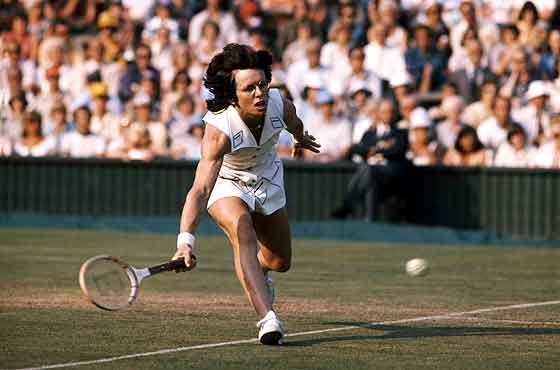
Chris Evert, who bet against Billie Jean King in the 1973 “Battle of the Sexes” smackdown against Bobby Riggs, now admits, “I was such an idiot. I’ve changed since.” And so she has. Evert, the ponytailed cutie-pie who brought out the closet Humbert Humbert in male spectators, has grown up to bronzed adulthood with a roguish wink. She looks terrific. As does Martina Navratilova, who helped Billie Jean to a record-breaking twentieth Wimbledon title in 1979, and who had an easier time negotiating the homophobic backlash because Billie Jean had already been there. Even Elton John looks good, resembling the autumnal Billie Jean herself, squared off like an owl in a container box. Did you know that Elton wrote “Philadelphia Freedom” for Billie Jean back in the days when she played for the Philadelphia franchise in World Team Tennis? That she sang backup vocal at several of his concerts? Neither did I—until I was told so by this latest absorbing installment in HBO’s Sports of the 20th Century series. And I thought I was an expert.
Besides being a hero of culture in general, without whom there might not ever have been a Title IX for female student athletes, Billie Jean is a personal cynosure of mine. We both grew up in Long Beach, California, in the fifties, but she actually did something about it. Under palm trees and burning Spanish tile, in perfumes of barbecue sauce and pepperwood sap, among surfboards, oil wells, landfill, aircraft factories, shopping malls, and real-estate scams, where churches looked like airports, high schools looked like filling stations, midwestern geriatrics trolled housing tracts in go-carts, and shore-leave sailors snorkeled the strand for grunion spawn, our town’s only claim to fame had been the Howard Hughes Spruce Goose, a huge plywood seaplane airborne exactly once. Even Lew Archer, the Freudian detective in the Ross Macdonald mystery series, left Long Beach the first chance he got. And then all of a sudden came Billie Jean, a hybrid of Artemis and Penthesilea.
For these early years, Billie Jean King: Portrait of a Pioneer sticks close to the story lines laid down in the autobiography she wrote in the early eighties with the help of Frank Deford, who is also interviewed here like a wise old tortoise. Though executive producers Ross Greenburg and Rick Bernstein choose not to mention her past enthusiasms for astrology and Ayn Rand, nor the fact that she’s part Seminole, we do spend quality time in blue-collar Long Beach, with her firefighter father, homemaking mother, and baseball-playing brother (Randy Moffitt), among the grammar schools and concrete courts in the public parks where the lower classes could play tennis for free.
Here is a familiar story of upward social mobility via organized sports instead of organized religion or organized crime. But here as well is a less familiar story, of democratizing from below. The genteel world of tennis into which Billie Jean entered at age 12, a chubby five feet four with glasses, was as white as it was male and moneyed, a country club of people born at center court. She never forgot scrounging for lessons, being sent home for not knowing better than to wear shorts when a skirt was required, having to make do without a scholarship despite the fact that she was Cal State’s best player, nor the coach who told her, at age 17, “you’ll be good because you’re ugly, Billie Jean.” So she attacked every net. And grew up from her first Wimbledon win, in doubles in 1961, to her feminist coming-of-age in the tumultuous sixties, to her organizing of the Virginia Slims tour, her unionizing of women players, her developmental work for the Women’s Sports Foundation and World Team Tennis, and, of course, her thrashing of Bobby Riggs in three straight sets, after which she would show up on The Odd Couple and Sonny & Cher and even talk at a press conference about bisexuality as if it weren’t a war crime.
Steel as well as spunkiness wiped that smirk from Riggs’s face. And no matter how much we may disdain the challenge match itself—as slick media snigger and Roone Arledge freak show, with Howard Cosell, George Plimpton, and Salvador Dalí making monkey faces—had Billie Jean lost, so would half the human race have lost as well, to chauvinist piglets. What is obvious now wasn’t then: Superior entertainment deserves at least equal pay. And while I am pleased to report that Billie Jean now is just as much a stranger to euphemism, just as much a self-made unslick child as she was in Long Beach, I am also startled to see how much she looks like Holly Hunter’s impersonation of her in Jane Anderson’s 2001 TV movie, When Billie Beat Bobby—the one capable in the Astrodome of laughing off the media circus, the sedan chair, the worrywarts, and the myrmidons, of sticking it to patriarchy with her terrible swift racquet.
Billie Jean King: Portrait of a Pioneer
HBO. Premieres Wednesday,
April 26, 10 p.m.